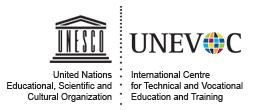TVET Promising Practices
Introduction
 As part of its clearinghouse function, and following the call issued at the Third International TVET Congress held in Shanghai in May 2012 for an enhanced role of the UNEVOC Network in the collection and dissemination of knowledge and evidence on TVET, UNESCO-UNEVOC aims to identify and share promising TVET practices for the benefit of the global TVET community, including policy makers and practitioners. The aim of this database is to share knowledge of established innovative practices – 'success stories'- that have proven to be effective and that promote TVET in some profound way, either within a particular TVET sub-sector or at local, regional or national level. The database presents information on a selection of effective and innovative programmes and initiatives from different TVET areas and regions of the world.
As part of its clearinghouse function, and following the call issued at the Third International TVET Congress held in Shanghai in May 2012 for an enhanced role of the UNEVOC Network in the collection and dissemination of knowledge and evidence on TVET, UNESCO-UNEVOC aims to identify and share promising TVET practices for the benefit of the global TVET community, including policy makers and practitioners. The aim of this database is to share knowledge of established innovative practices – 'success stories'- that have proven to be effective and that promote TVET in some profound way, either within a particular TVET sub-sector or at local, regional or national level. The database presents information on a selection of effective and innovative programmes and initiatives from different TVET areas and regions of the world.
More specifically, the database aims to:
- identify and gather evidence-based policy and practices, thus contributing to the knowledge base on TVET policies and practices;
- share information on successful and transferable TVET initiatives;
- encourage local, national and regional cooperation in TVET;
- promote the role of TVET in the world of work and sustainable development
- Impact
- Innovation and creativity
- Knowledge base
- Stakeholder engagement
- Monitoring and evaluation
- Efficiency
Disclaimer
UNESCO-UNEVOC is not responsible for the quality of the initiatives or programmes included in this database, is not managing or implementing them and has not evaluated them. For more information about any aspects of these programmes please use the contact details presented in each case study entry.
